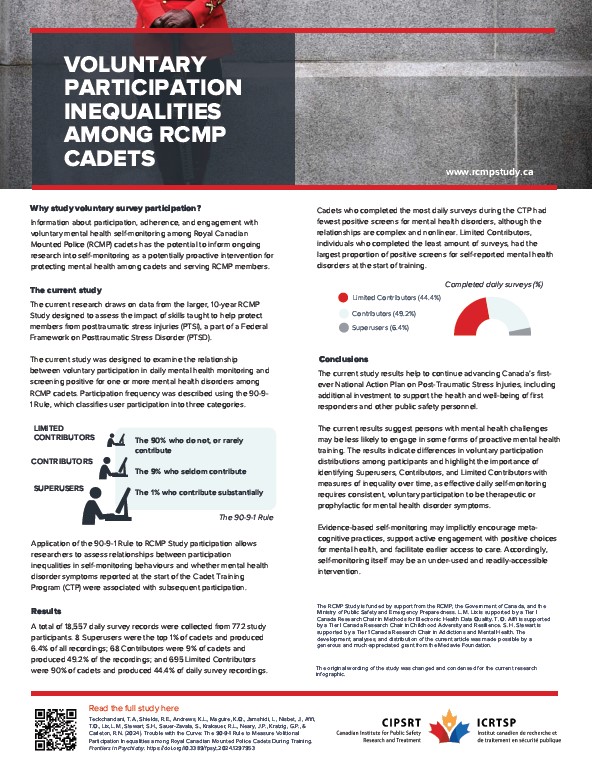Research Summaries
Why was the study done?
The current study was designed to examine the relationship between voluntary participation in daily mental and physical well-being surveys and screening positive for one or more mental health disorders among Royal Canadian Mounted Police (RCMP) cadets.
The current study was also designed to assess the multidimensionality of voluntary participation within digital health data collection frameworks used in the longitudinal RCMP Study. Application of the 80-20 distribution and the 90-9-1 Rule to RCMP Study participation allows for the assessing of relationships between participation inequalities in self-monitoring behaviours as well as whether mental health disorder symptoms at pre-training were associated with subsequent participation.
What was done in the study?
The current research is part of a larger RCMP Study designed to 1) develop, deploy, and assess the impact of a system for ongoing annual, monthly, and daily evidence-based assessments; and 2) enhance the RCMP Cadet Training Program (CTP) with evidence-based skills to help reduce the frequency or severity of PTSI symptoms. A research summary of the previously published Study Protocol can be read here.
Participants (772, 72 % male) completed a Full Assessment prior to their training at the CTP, which included screening tools for generalized anxiety disorder (GAD), major depressive disorder (MDD), posttraumatic stress disorder (PTSD), alcohol use disorder (AUD), and panic disorder (PD). Participants also completed short daily surveys throughout their training self-assessing their physical and mental wellbeing. Participation frequency was described using the 90-9-1 Rule, which classifies user participation into three categories: Lurkers (also known as Limited Contributors; the 90% of actors who do not, or rarely actively participate), Contributors (the 9% who seldom contribute), and Superusers (the 1% who contribute substantially.
What did we find out?
A total of 18,557 daily survey records were collected. 8 Superusers represented the top 1% of cadets and produced 6.4% of all daily survey recordings; 68 Contributors represented 9% of the total number of cadets and produced 49.2% of all daily survey recordings; and 695 Limited Contributors accounted for 90% of the total number of cadets and produced 44.4% of all daily survey recordings. Limited Contributors had the largest proportion of positive screens for self-reported mental health disorders at pre-training.
The current study was designed to assess for associations between voluntary participation inequalities in daily mental health monitoring among cadets and their pre-training mental health, and subsequently demonstrates the potential for a predisposition to engage in self-monitoring behaviours based on pre-existing self-reported mental health disorder symptoms. Cadets who completed the most daily surveys during the CTP had fewest positive screens for mental health disorders, although the relationships are complex and nonlinear.
Where do we go from here?
These results help to continue advancing Canada’s first-ever National Action Plan on Post-Traumatic Stress Injuries, including additional investment to support the health and well-being of first responders and other public safety personnel.
The results indicate differences in voluntary participation distributions among participants and highlight the importance of identifying Superusers, Contributors, and Limited Contributors with measures of inequality over time, as effective daily self-monitoring requires consistent, voluntary participation to be therapeutic or prophylactic for mental health disorder symptoms.
The creation of highly individualized, population-based mental health injury programs has been limited by an incomplete understanding of the causal relationships between protective factors and mental health. The current results suggest persons with mental health challenges may be less likely to engage in some forms of proactive mental health training. The current results also provide useful information about participation, adherence, and engagement that can be used to inform evidence-based paradigm shifts in health-related data collection in occupational populations.
Evidence-based self-monitoring may implicitly encourage meta-cognitive practices, support active engagement with positive choices for mental health, and facilitate earlier access to care. Accordingly, self-monitoring itself may be an under-used and readily-accessible intervention, in addition to being a tool for measurement-based care or evaluating intervention effectiveness within clinical trials (Andersen et al., 2023). The current results require replication and extension; in the interim, the results provide useful information about participation, adherence, and engagement with self-monitoring, which may inform ongoing assessments of self-monitoring as a proactive intervention for protecting mental health.
The RCMP Study is funded by support from the RCMP, the Government of Canada, and the Ministry of Public Safety and Emergency Preparedness. L. M. Lix is supported by a Tier I Canada Research Chair in Methods for Electronic Health Data Quality. T. O. Afifi is supported by a Tier I Canada Research Chair in Childhood Adversity and Resilience. S. H. Stewart is supported by a Tier 1 Canada Research Chair in Addictions and Mental Health. The development, analyses, and distribution of the current article was made possible by a generous and much-appreciated grant from the Medavie Foundation.
The original wording of the study was changed and condensed for the current research summary.
Original study
Teckchandani, T. A., Shields, R. E., Andrews, K. L., Maguire, K. Q., Jamshidi, L., Nisbet, J., Afifi, T. O., Lix, L. M., Stewart, S. H., Sauer-Zavala, S., Krakauer, R. L., Neary, J. P., Kratzig, G. P., & Carleton, R. N. (2024). Trouble with the Curve: The 90-9-1 Rule to Measure Volitional Participation Inequalities among Royal Canadian Mounted Police Cadets During Training. Frontiers in Psychiatry. https://doi.org/10.3389/fpsyt.2024.1297953
Prepared by T. Teckchandani.
